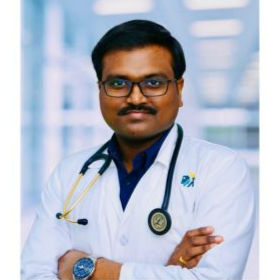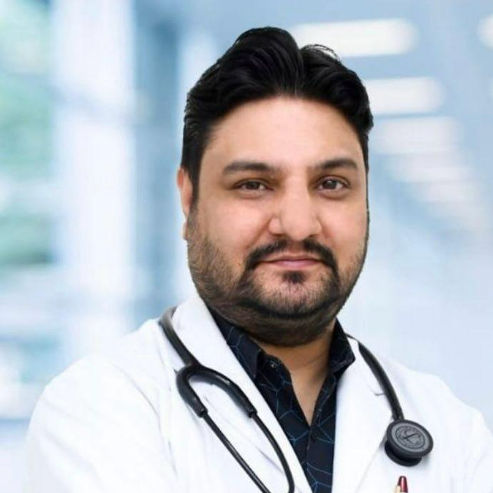Gastric Problem Signs, Causes and Treatment Guide
Learn the common signs of gastric problems, their root causes, and effective treatment options. Discover lifestyle tips, diet guidance, and when to seek medical care.

Written by Dr. M L Ezhilarasan
Reviewed by Dr. Shaik Abdul Kalam MD (Physician)
Last updated on 13th Jan, 2026

Introduction
Feeling a heavy, burning, or bloated sensation after meals? You’re not alone. “Gastric problem” is a common phrase used to describe many upper stomach issues—from everyday indigestion to gastritis, reflux, or even ulcers. While most gastric problems are short-lived and respond to simple steps, some symptoms may indicate underlying conditions that require timely treatment.
This guide brings together advice from leading health sources and clinical guidelines on the signs, causes, diagnosis, and treatment of gastric problems. You’ll learn how infections like H. pylori, certain medications, diet, stress, and sleep patterns can trigger symptoms; how doctors diagnose these conditions; and which treatments—from home remedies to prescription options—actually work. We also cover dietary recommendations, when to seek medical care, and strategies to prevent recurrences. If symptoms persist beyond two weeks, consult a doctor online with Apollo 24|7 for further evaluation.
Understanding gastric problems
Here's an overview of gastric issues and how your stomach works:
What doctors mean by “gastric”
In everyday language, “gastric problem” usually refers to discomfort in the upper abdomen—fullness, burning, or pain—especially around mealtimes. Clinically, doctors group many of these symptoms under dyspepsia (indigestion), which includes epigastric pain, post-meal fullness, and early satiety. Related conditions include gastritis (inflammation of the stomach lining), peptic ulcer disease (ulcers in the stomach or duodenum), and gastro-oesophageal reflux disease (GERD), where acid flows up into the oesophagus.
Common conditions under the gastric umbrella
• Functional dyspepsia: Persistent indigestion symptoms without visible damage on endoscopy; the most common cause of chronic indigestion.
• Gastritis: Inflammation of the stomach lining caused by H. pylori, alcohol, or medications (notably NSAIDs).
• Peptic ulcer disease: Open sores in the stomach or duodenum often due to H. pylori or NSAIDs; can bleed or perforate if untreated.
• GERD: Heartburn and regurgitation due to acid reflux; overlaps with “gastric” symptoms for many people.
Consult Top Specialists
How your stomach protects itself
Acid, enzymes, and the mucosal barrier
The stomach secretes acid and pepsin to break down food. A mucus-bicarbonate layer and tight cell junctions shield the lining from damage. When this balance is disrupted—too much acid, too little protection, or a direct irritant—you can experience inflammation and pain.
Nerves, motility, and the brain–gut axis
The stomach relaxes rhythmically to accommodate meals and empties food downstream. Stress and poor sleep can change motility and pain perception via the brain–gut axis, amplifying discomfort even when tests are normal, as seen in functional dyspepsia.
Signs and symptoms of a gastric problem
Here's what to look for:
Typical symptoms you might notice
• Burning or gnawing pain in the upper belly (epigastrium)
• Bloating and uncomfortable fullness after small meals
• Belching, sour taste, or mild nausea
• Early satiety (feeling full quickly)
• Heartburn or regurgitation (if reflux overlaps)
These symptoms often flare after large, fatty, spicy, or late-night meals, alcohol, or coffee—common triggers for gastric pain causes.
Alarm signs that need urgent care
Red flags suggest complications or another diagnosis and warrant prompt evaluation:
• Unintentional weight loss
• Repeated vomiting or vomiting blood; black tarry stools
• Trouble swallowing, food sticking
• Severe, sudden pain; fever; fainting
• New-onset symptoms after age 55–60
• Anaemia or fatigue
• Family history of stomach or oesophageal cancer
If you notice any of these, book a physical visit to a doctor with Apollo 24|7 without delay.
Symptom patterns by condition
• Functional dyspepsia: Fluctuating fullness/epigastric pain, normal endoscopy, worsens with stress or certain foods.
• Gastritis: Burning pain, nausea; aggravated by alcohol, NSAIDs; may improve with PPIs.
• Ulcer: Night-time or fasting pain relieved by food or antacids; risk of bleeding with black stools.
• GERD: Heartburn, regurgitation, worse after lying down; night symptoms are common.
What leads to these signs? Root causes and triggers
Here's how common factors contribute to gastric symptoms:
Infection: Helicobacter pylori
H. pylori infects a significant portion of people worldwide and is a leading cause of gastritis and peptic ulcers. Eradicating it often relieves symptoms and prevents complications. Transmission is likely oral–oral or faecal–oral. Not everyone with H. pylori develops symptoms, but in those with dyspepsia, testing and “test-and-treat” strategies help.
Medications: NSAIDs, aspirin, steroids
Regular NSAID or aspirin use impairs the stomach’s protective barrier, increasing the risk of gastritis, ulcers, and bleeding; risk rises with age, higher doses, anticoagulants, or corticosteroids. If you need NSAIDs, ask about gastroprotection with a PPI or alternatives.
Diet and habits: alcohol, smoking, caffeine, late meals
• Alcohol irritates the stomach lining and can worsen gastritis.
• Smoking impairs healing and increases ulcer recurrence.
• Coffee and carbonated drinks can aggravate reflux in some people.
• Large, fatty, spicy, or late-night meals commonly worsen indigestion and reflux.
Stress, sleep, and the brain–gut connection
Stress, anxiety, and poor sleep alter gut motility and sensitivity, magnifying pain signals. Stress management and cognitive-behavioural strategies can reduce symptoms of functional dyspepsia.
Coexisting conditions: diabetes, thyroid, IBS
• Diabetes can slow stomach emptying (gastroparesis), causing early satiety, nausea, and bloating.
• Thyroid disorders and IBS frequently overlap with dyspepsia, complicating diagnosis.
Structural issues: hiatal hernia and delayed emptying
A hiatal hernia can worsen reflux, while delayed gastric emptying (idiopathic or medication-induced) can mimic “gastric problem” symptoms. Doctors may suspect these when symptoms are refractory or positional.
Getting the right diagnosis
Here's how gastric problems are evaluated:
When to see a doctor and what to expect
See a clinician if symptoms persist beyond two weeks, recur frequently, or include any red flags. Your doctor will take a history (diet, medications), perform an exam, and decide on testing or short PPI therapy.
First-line tests (blood, breath, stool) and what they show
• H. pylori stool antigen or urea breath test: Detect active infection.
• Blood tests: Check for anaemia and metabolic clues.
• Celiac serology: If symptoms suggest.
PPIs and antibiotics can suppress H. pylori and cause false negatives. Apollo 24|7 offers home collection for H. pylori stool antigen, CBC, and other relevant tests.
When endoscopy or imaging is needed
Upper endoscopy is recommended for red flags, older age onset, or persistent symptoms. It visualises inflammation, ulcers, strictures, and can take biopsies.
Smart use of services
Online consults and home sample collection (Apollo 24|7)
If symptoms are mild without red flags, start with an online consultation and arrange noninvasive testing or medication review.
Follow-up and monitoring
Reassess symptoms after 2–4 weeks. If H. pylori is treated, confirm eradication with breath or stool testing 4+ weeks after antibiotics.
Consult Top Specialists
Treatment pathways: from home fixes to prescriptions
Here's how gastric problems are managed stepwise:
Immediate self-care steps that work
• Eat smaller, more frequent meals; avoid lying down for 2–3 hours after eating.
• Reduce triggers: alcohol, tobacco, late heavy meals, and excess coffee.
• Try ginger or chamomile tea for mild nausea.
• Elevate the head of the bed 6–8 inches for night reflux.
Over-the-counter options: antacids, alginates, H2 blockers, PPIs
• Antacids and alginates provide quick relief.
• H2 blockers reduce acid for several hours.
• PPIs are stronger acid suppressors; short courses are effective.
Prescription therapies and protocols
H. pylori eradication (modern regimens)
Modern first-line therapy often uses bismuth quadruple therapy (PPI + bismuth + tetracycline + metronidazole) for 10–14 days, with eradication confirmation after therapy.
Prokinetics, neuromodulators for functional dyspepsia
Prokinetics can help meal-related fullness; low-dose neuromodulators may reduce pain hypersensitivity and improve sleep. These are prescribed and monitored by clinicians.
Complementary approaches with evidence
• Peppermint oil (enteric-coated) can relax GI smooth muscle.
• Probiotics may reduce dyspepsia and H. pylori treatment side effects.
• Psychological therapies like CBT and mindfulness can reduce functional dyspepsia symptoms.
When procedures or surgery are considered
• Complicated ulcers may require endoscopic or surgical management.
• Refractory GERD may need anti-reflux procedures.
Eating and living for a healthier stomach
Here's how to support your stomach daily:
Evidence-based diet tips
• Use lower-fat cooking and lean proteins.
• Include soluble fibre; avoid very spicy or acidic foods if aggravated.
• Dairy tolerance varies; try lactose-free options.
• Hydrate between meals rather than during large meals.
Meal timing, portioning, and symptom journaling
• Eat moderate portions every 3–4 hours; avoid heavy meals within 3 hours of bedtime.
• Track food, portion, timing, stress, sleep, and symptoms for two weeks.
A gentle-stomach 7-day sample plan
• Breakfast: Oatmeal with banana; eggs with spinach; lactose-free yoghurt.
• Lunch: Rice with grilled chicken and cooked vegetables; lentil soup with toast.
• Dinner: Baked fish with sweet potato; tofu stir-fry; khichdi or congee.
• Snacks: Papaya, pears, crackers with hummus, ginger tea.
Movement, sleep hygiene, and stress skills
• 20–30 minutes of daily activity.
• 7–8 hours sleep; elevate the bedhead for reflux.
• Daily stress practice: 5-minute breathing, journaling, or a short walk.
Special populations and scenarios
Here's how gastric problems differ by group:
Children and teens
Most are functional and benign, but red flags require swift evaluation. Avoid overusing PPIs; H. pylori testing only if indicated.
Pregnancy and postpartum
Progesterone slows motility, increasing reflux. Prefer lifestyle measures; antacids and alginates are often safe. Discuss any medication with your obstetric provider.
Older adults and polypharmacy
Higher risk from NSAIDs, anticoagulants, and dual antiplatelets. Early endoscopy may be required for new symptoms.
Athletes and shift workers
Intense exercise or late circadian eating patterns can aggravate reflux. Focus on lighter pre-activity meals and structured sleep.
Prevention and long-term management
Here's how to reduce recurrence:
Trigger awareness and medication safety
• Limit NSAIDs; use lowest dose, shortest duration, with PPI protection if needed.
• Moderate alcohol; stop smoking.
• Keep a simple trigger-action plan for recurring symptoms.
Food safety and hygiene
• Hand hygiene and safe food/water reduce gastrointestinal infections.
• Avoid sharing utensils with someone acutely ill.
Monitoring, step-down therapy, and recurrence prevention
• Step down PPIs once symptoms are controlled.
• Confirm H. pylori eradication to prevent ulcers.
• Reassess after medication changes, illness, or stress.
Consult Top Specialists
Conclusion
Gastric problems are common and treatable once you understand the causes. Most people can link post-meal fullness, burning, or bloating to triggers such as H. pylori, NSAIDs, late heavy meals, alcohol, smoking, stress, or poor sleep. A stepwise approach often works: practical lifestyle and meal changes, OTC relief, and, if needed, testing for H. pylori or short PPI therapy. Red flags require prompt medical attention, and persistent symptoms need evaluation to rule out ulcers or other conditions.
Keep a two-week symptom journal and make high-yield changes. Confirm H. pylori eradication after antibiotics. If symptoms persist beyond two weeks, consult a clinician—Apollo 24|7 online consultations and home sample collection make testing convenient. With the right plan, most gastric problems improve, allowing you to eat and live comfortably.
Consult Top Specialists

Dr. Sanjay Sikka
Gastroenterology/gi Medicine Specialist
35 Years • MBBS, MD(Med), FACG
Delhi
Apollo Hospitals Indraprastha, Delhi
(200+ Patients)

Dr. Chethan T L
General Physician/ Internal Medicine Specialist
5 Years • MBBS, MD, DNB (General Medicine)
Bengaluru
Apollo Medical Center, Marathahalli, Bengaluru
Dr. Sasikamalam
General Practitioner
1 Years • MBBS
COIMBATORE
Apollo Sugar Clinic Coimbatore, COIMBATORE

Dr. Jatin Yegurla
Gastroenterology/gi Medicine Specialist
11 Years • MD (PGI), DM (AIIMS Delhi), FAGIE (AIIMS Delhi), ESEGH (UK), Gold Medalist
Hyderabad
Apollo Hospitals Jubilee Hills, Hyderabad
(675+ Patients)

Dr. Amit Pandita
Gastroenterology/gi Medicine Specialist
10 Years • MBBS. MD (INTERNAL MEDICINE) DrNB (GASTROENTEROLOGY AND HEPATOLOGY)
Delhi
Apollo Hospitals Indraprastha, Delhi
Consult Top Specialists

Dr. Sanjay Sikka
Gastroenterology/gi Medicine Specialist
35 Years • MBBS, MD(Med), FACG
Delhi
Apollo Hospitals Indraprastha, Delhi
(200+ Patients)

Dr. Chethan T L
General Physician/ Internal Medicine Specialist
5 Years • MBBS, MD, DNB (General Medicine)
Bengaluru
Apollo Medical Center, Marathahalli, Bengaluru
Dr. Sasikamalam
General Practitioner
1 Years • MBBS
COIMBATORE
Apollo Sugar Clinic Coimbatore, COIMBATORE

Dr. Jatin Yegurla
Gastroenterology/gi Medicine Specialist
11 Years • MD (PGI), DM (AIIMS Delhi), FAGIE (AIIMS Delhi), ESEGH (UK), Gold Medalist
Hyderabad
Apollo Hospitals Jubilee Hills, Hyderabad
(675+ Patients)

Dr. Amit Pandita
Gastroenterology/gi Medicine Specialist
10 Years • MBBS. MD (INTERNAL MEDICINE) DrNB (GASTROENTEROLOGY AND HEPATOLOGY)
Delhi
Apollo Hospitals Indraprastha, Delhi
Consult Top Specialists

Dr. Sanjay Sikka
Gastroenterology/gi Medicine Specialist
35 Years • MBBS, MD(Med), FACG
Delhi
Apollo Hospitals Indraprastha, Delhi
(200+ Patients)

Dr. Chethan T L
General Physician/ Internal Medicine Specialist
5 Years • MBBS, MD, DNB (General Medicine)
Bengaluru
Apollo Medical Center, Marathahalli, Bengaluru
Dr. Sasikamalam
General Practitioner
1 Years • MBBS
COIMBATORE
Apollo Sugar Clinic Coimbatore, COIMBATORE

Dr. Jatin Yegurla
Gastroenterology/gi Medicine Specialist
11 Years • MD (PGI), DM (AIIMS Delhi), FAGIE (AIIMS Delhi), ESEGH (UK), Gold Medalist
Hyderabad
Apollo Hospitals Jubilee Hills, Hyderabad
(675+ Patients)

Dr. Amit Pandita
Gastroenterology/gi Medicine Specialist
10 Years • MBBS. MD (INTERNAL MEDICINE) DrNB (GASTROENTEROLOGY AND HEPATOLOGY)
Delhi
Apollo Hospitals Indraprastha, Delhi
More articles from Gastric Trouble
Frequently Asked Questions
1) What are the most common signs of a gastric problem?
Upper abdominal burning or pain, bloating, early fullness, belching, mild nausea, and sometimes heartburn. Seek urgent care for red flags: weight loss, vomiting blood, black stools, or trouble swallowing.
2) How do I know if I have gastritis vs an ulcer?
Both can cause burning epigastric pain. Ulcer pain often occurs on an empty stomach or at night and may improve after eating; bleeding risk is higher. Endoscopy differentiates them. Consult a doctor online with Apollo 24|7 if symptoms persist beyond two weeks.
3) Which test is best for H. pylori?
Urea breath test or stool antigen test detects active infection. Pause PPIs for 2 weeks before testing. Apollo 24|7 offers home collection for stool antigen testing.
4) What is the safest treatment for functional dyspepsia?
Start with lifestyle: smaller, earlier meals; lower fat/spice; stress and sleep optimisation. Short PPI trials can help. Persistent cases may benefit from prokinetics, low-dose neuromodulators, or psychological therapies.
5) Can I prevent NSAID-related gastric problems?
Use the lowest effective NSAID dose, avoid alcohol or smoking, and consider PPI protection if at higher risk. Discuss NSAID alternatives with your clinician.


